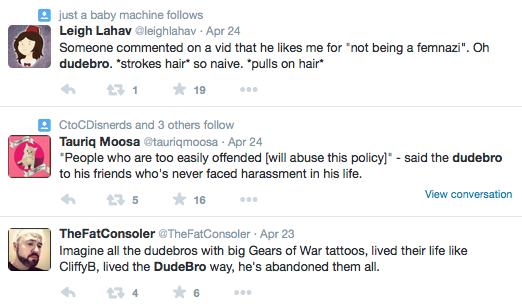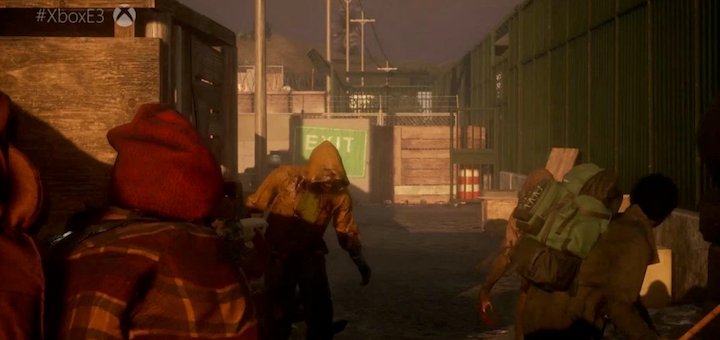Perhaps you’ve already decided this is going to be a piece ripping apart the so-called “dudebro.” That’s fair. I’m occasionally brash. I often believe my opponents are delusional, and I have no problem stating so in an argument. There is a long list of behaviors and beliefs I consider irrational and delusional, including (but not limited to) belief in #GamerGate, belief that attacks towards those in power are the exact same as attacks towards those who are marginalized and disenfranchised, and the belief that the fight for equality for women is at the expense of men, games, and geek or nerd culture as a whole. This however, is not a tear-down of the dudebro, but rather an investigation into the history of the dudebro and a discussion of the power you get and give away when you insult people, make caricatures out of stereotypes, and name something to make it real.
To name something is powerful. Sapir and Whorf knew this, as did many philosophers and linguists who posited that by naming something you bring it into existence. The“dudebro” is a new term that has sprouted up as a way to name a particular kind of perceived culture, perhaps as a way to bring it into existence, but mostly, it seems, to put a name on something so as to crush it. Calling out the “dudebro” culture has been one tactic of women to fight against the seemingly overwhelming numbers of men who dislike women (mostly feminists), are homophobic, and also somehow consider themselves enlightened. I’m going to step back and examine the etymology of the dudebro phenomenon, and then talk about how insults, making caricatures out of people and movements, and power are all related.
- What is a Dudebro?

The term dudebro is a combination of the words “dude” and “bro,” neither inherently a bad thing, though “dudebro” is almost never used positively. It’s used as a label for 15-20 something white, usually affluentish (at least having completed high school), men. They are often associated with listening to shitty and esoteric music, binge drinking, sexually assaulting women, relying on their mothers for everything while simultaneously hating women, being in frats, going to monster truck rallies and so on.
There is also an official offshoot of the dudebro, which is the dudebro gamer. The dudebro gamer is maligned for typically only playing first person shooters and/or sports games. Dudebro gamers are hated by male and female gamers alike. Dudebros often feel as if they’re being attacked or maligned unfairly for being sexist, racist, homophobic, and so on. They’ve adopted just enough language from feminist and other equality groups that they can pretend to be oppressed.
- Why am I talking about Dudebros?

The dudebro language very closely resembles the #GamerGate language. The dudebro label seems to be loudly resonating in particular circles, specifically in feminist circles and in gaming circles. It’s a way for male self-proclaimed nerds to take back the gamer power from this imagined dudebro, aka frat guys or jocks who are perceived as taking away power, funding dollars, and the spotlight from the nerd and geek. Women are using the term as a way to label and then devalue the arguments, threats, and insults being used against them by misogynists. If you think about it, it’s actually a brilliant move: the dudebro is the perfect scapegoat, both misogynist and anti-nerd. They bring together male geeks and nerds with female geeks and nerds, as well as with feminists. Geek culture isn’t attacking women, dudebros are. While this may sidestep reality in any number of ways, it’s an interesting rhetorical tactic that is gaining some traction, as well as bringing together two parties that have long been in conflict.
Labels have power. They empower those who identify with their message, such as those who found a home in #GamerGate. Right or wrong, that label gave those who identified with the movement (movement? Hate group? Who knows?) a sense of power and belonging. This in turn encourages activism, a sense of voice, and a feeling of community. Labels also have power for bringing a group into existence, as I mention above. The derogatory label feminazi has power because it pulls together outspoken feminists in a negative way, giving people an easy and thoughtless way to ignore and dismiss things these women say. You don’t need to listen to her, she is just a feminazi. By creating the label and the term, you devalue and are able to dismiss anything the person says before she says it. Of course YOU would say that, you’re a republican. And so on. We process a lot of information every day. Labels help tell us what’s important and what can be ignored.
- Dudebro on the loose

Dudebro, like feminazi, is a particularly interesting term because it is not used in a positive way, nor do many people use the term to rally around. It is a caricature. Being a #GamerGater has important in-group features that people can rally behind. This is one reason it’s so volatile for some when #GamerGate is attacked: its members choose to be a part of it. Whatever it was about GG that attracted people, they’ve chosen to identify with the movement. This means they’re a part of the good (is there any with gaters?) and the bad. No one wants to be a dudebro, on the other hand. This is one of the reasons it’s been such a powerful rebuttal for women online. There are always ways to call out women, yet until #GamerGate, and now Dudebro, there were few ways for us to name our attackers.
As can be seen in the pictures throughout this article, it seems like the Dudebro might be the answer to many prayers. There is someone that can be blamed for how messed up things are in the gaming community without directly attacking certain people (because no one identifies as a dudebro on purpose). Has the dudebro given women the chance to name their attackers with a label that makes sense to those who aren’t attacked and threatened and harassed? I’m not sure that this is going to be so simple…
4. What’s the rub then?
To recap: the dudebro has hitherto been used as a caricature, to call out behaviors that most people in the gaming community find offensive, wrong, and detrimental to gaming. I’ve seen recently in some academic circles that I won’t link to that confirms that dudebro has begun to shift meaning and usage. Rather than being used to name specific anti-women and anti-nerd behavior, dudebro has come to be a label for any male perceived as pro-male. I’ve seen it be called “dudebro” to be a part of a male-only group of friends; I’ve seen it be called “dudebro” for men to write academic articles with other men; even Facebook conversations are called dudebro. People use this term because they can’t name what is really at the heart of the problem when it comes to all male groups of academic, “boys clubs” that write together, or certain philosophies that privilege the male perspective. These are real problems that need to be addressed, but they aren’t dudebro.
Using dudebro to call someone out is satisfying. When you’ve been demeaned and belittled for so long, when people have labeled and dismissed you your whole life, it feels good to have an insult like dudebro in your back pocket. The dudebro is so hated, applying it to someone will always provoke a defensive, hurt response. It names something non-dudebros are afraid of being. Currently it’s a powerful term.
Given all this, here is my warning: be careful how you apply dudebro. The label at once devalues real sexist, misogynist, and homophobic actions and it will lose power and support if it is applied to situations where it is not warranted. Of course you said that, you’re just a dudebro excuses problematic behavior. On the other hand, see him with all his buddies? What a dudebro takes away the real meaning from the term.
Language. Isn’t it neat?




